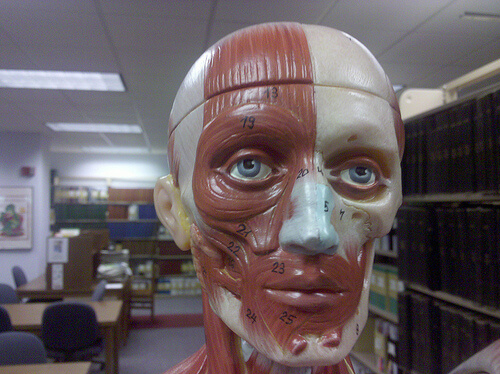Affecting about 40,000 people in the United States every year, Bell’s palsy is a neurological disorder that manifests as a paralysis of the face. This disorder often affects only one side of the face. Bell’s palsy is thought to be a result of damage to the facial nerve that controls the muscles on one side of the face, which then causes those muscles to droop. The facial nerve damage that affects the facial muscles can also impact a person’s taste, saliva, or ability to cry. Bell’s palsy is most common in young adults, the elderly, diabetics, and pregnant women, but it can affect anyone.

This condition is often a shock, as it comes on overnight. The majority of patients wake with the facial muscles in paralysis. Most patients either have no symptoms beforehand, or they miss the warning signs, which are subtle and can include neck pain, pain behind the ear, or pain in the back of the head. People with Bell’s palsy can experience difficulty with multiple facial functions including closing their eyes, eating, smiling, and their speech can also become slurred. Often, people jump to the conclusion that a stroke has occurred, but thankfully, Bell’s palsy is not the result of a stroke, and is also a temporary affliction. While the condition comes on suddenly, it usually passes or gets better on its own within three weeks.
Natural Remedies in Traditional Chinese Medicine for Bell’s Palsy
While the patient is waiting for signs of the condition to alleviate, there are several natural remedies that can quicken the recovery process. In traditional Chinese medicine, herbal remedies may be used to promote effective functioning of the nervous system, prevent stress (which is thought to exacerbate Bell’s palsy), and offer a therapeutic effect. Some herbs can be used to treat conditions relating to the nervous system. Taking certain vitamin supplements can also promote nerve growth and may help quicken the recovery of the damaged facial nerve.
Massage can also help ease the symptoms of Bell’s palsy. Gently massaging the afflicted areas of the face, or practicing daily facial exercises can help the condition. Additionally, a full body massage on areas that are unaffected by the condition can help. Stress can worsen the condition, and is often thought to be a precipitating factor that may bring on an episode, so receiving a relaxing, full body massage can help soothe a patient and lead to a quicker recovery.
Are you interested in becoming a certified acupuncture professional?
Visit the links below to explore our specialized acupuncture programs at a campus near you:
The Role of Acupuncture and Holistic Approaches in Treating Bell’s Palsy
In traditional Chinese medicine (TCM), the diagnosis for Bell’s palsy is termed “External Wind-Cold attacking the channels of the face”. According to TCM principles, one of the main implications of this condition is an underlying qi (a person’s inherent energy) deficiency. In China, acupuncture has been used for thousands of years to assist in Bell’s palsy recovery, and the initial treatment goal according to TCM would be to expel Wind and resolve Damp, as well as to invigorate qi and promote blood circulation to the face. Consistent acupuncture treatments (usually recommended once or twice per week), can help soothe a patient and expedite resolution of paralysis, and enhance nerve function.
Patients with Bell’s palsy can have several weeks of recovery time in which they may choose to stay at home and take some time off from their normally rigorous daily routines. Traditional Chinese medicine and holistic healing have several options, from herbal remedies to massage and acupuncture, to vitamin supplements, that patients may wish to investigate during their recovery period. The prognosis and treatment should involve consultation with a licensed acupuncturist for the best course of action specific to the individual patient.
Featured Posts:
- Trauma 2020: Where We Wear It and How We Treat It
- The Benefits of TCM and Acupuncture for Epilepsy
- Ancillary Services for Enhancing Cosmetic Facial Acupuncture Outcomes and Increasing Business Revenue
- Chinese Medicine and the Internal Pharmacy: An Introduction to a Profound Understanding of Human Health and Disease

